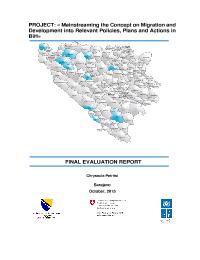SummarySince the Migration for Development (M&D) Project is basically a ?development-oriented? intervention, and since economic development is the most pressing need of BiH, then it is highly relevant to the country?s needs.
The Project has been very effective at achieving outputs.
Overall financial efficiency of Project resources remains high, at least for the horizontal component. It is apparent from the above figures that the financial efficiency of this component is excellent. Even if we factor in the entire Project costs (and not only the LG interventions costs) then the respective figures become:
? a USD 3150 per job safeguarded or created mean Project cost, which still compares favourably to other economic development incentives; and
? a 2.06 benefit/cost ratio, i.e. still a high efficiency rate.
Finally, implementation costs are relatively high for country standards. Considering that this unit cost concerns specialized professional services and the relative lack of effective such services in the country, it is deemed reasonable. However, it should be decreased in the future.
Local governments projects have mainly contributed to local development through the creation or safeguarding of jobs and through securing a stable income for the participating individuals. Also, the new income produced by the LG projects, through its multiplier effects (i.e. through an increase in local consumption), has the capacity to create more local economic activity. However, the magnitude of such impacts is expected to be very low due to a) the lack of ?critical mass? in any given locality.
Another significant impact of the pilot projects is the increased demand from local populations for similar interventions by the respective local governments. This means that local governments will need more resources in order to accommodate such pressures.
The last important expected impact of local priorities is on the way local communities communicate with the diaspora and on the way they incorporate M&D concepts in their local development programmes.
Some types of results produced from the Project appear to be more sustainable than others. For example, the results achieved by the local government projects seem to be quite robust at least for the medium-term. The same cannot be said for the capacity-building activities, both at local level and at higher level. As ?knowhow? is something possessed by a specific individual, the sustainability of the capacity building actions depends on how widely within the organization this knowhow is spread, on whether this organization has a high turnover of staff, and to what extent this knowhow is ?institutionalized?. Taking these factors into account, it appears that capacity building at the local level is more sustainable than the capacity-building provided to the Ministry for Human Rights and Refugees of Bosnia and Herzegovina and to the policy working group on M&D.



